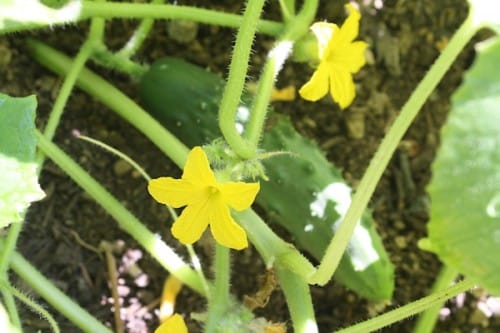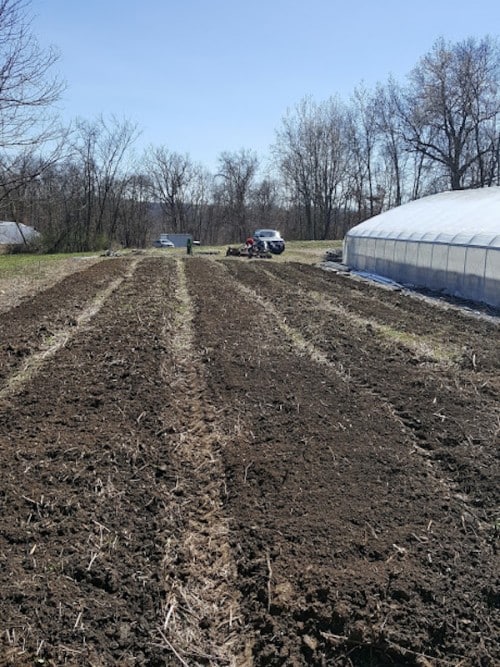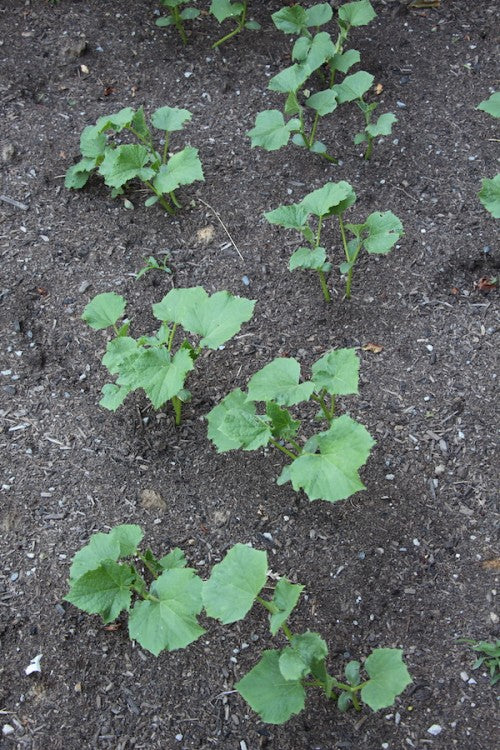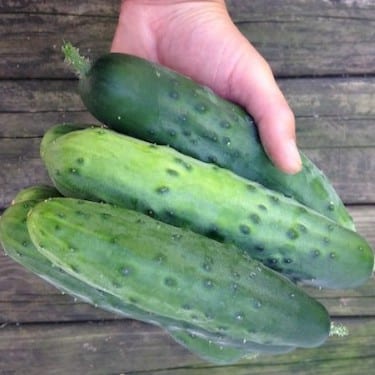
Our method of cucumber farming
As a USDA Certified Organic farm, here at Cherry Valley Organics we start the cucumber farming process by selecting the best varieties for our climate. We seek out cucumber varieties with a natural resistance to an array of diseases, such as powdery mildew, anthracnose, and cucumber mosaic virus. And, of course, we also keep flavor and texture in mind, too. It's essential that we grow cultivars that size-up consistently and uniformly, and that our cucumbers are crunchy and non-bitter.
For this season, we have two favorite varieties.
- 'Calypso': This is a smaller cucumber that's perfect for pickling or fresh eating. It's a hybrid that's ready to harvest just 52 days after planting. Interestingly, the plants are gynoecious, which means they produce only female flowers. As long as you have a pollinating partner variety planted nearby, each flower will produce a fruit and result in huge yields. So, the second cucumber variety we grow is not just there for harvesting but it's also there to help pollinate the 'Calypso' plants by producing both female and male flowers.
- 'Marketmore 76': Both an excellent pollination partner for 'Calypso' and a downright delicious and productive cuke itself, 'Marketmore 76' is the gold-standard of cucumbers on our farm and many others. The cucumbers reach 8-9 inches in length and have dark, beautiful skin. Though it's later to produce than some other varieties, 'Marketmore 76' is a slicer with a taste and texture that can't be beaten.

Planting cucumbers on the farm
We start planting cucumbers soon after the danger of frost has passed. Here in Pennsylvania, that's typically in late May. The cucumber field is tilled and prepared with a layer of organic compost. While some other cucumber farming operations mulch their planting beds with black plastic, we prefer to mulch our cucumbers with a layer of straw. It keeps the developing fruits up off the soil, reduces weed competition, and helps retain soil moisture.

At the proper planting time, the seeds are sown directly into the soil one-inch-deep and about a foot apart. Close spacing like this means the vines grow thick and lush, further helping to limit weed growth and serve as a living mulch. Cucumbers can be grown vertically, too, and it's something we've experimented with in the past by growing the vines up a trellis.
If you grow cucumbers and you're concerned about the vines growing too large, there are several bush-type cucumber varieties whose vines grow just two to three feet long, but the plants produce plenty of full-sized cucumbers. These compact cucumbers are a good bet for smaller cucumber farming operations or home gardens.

Caring for our cucumber plants
Once the seedlings are up and growing, it's our job to make sure they're happy and healthy. Our organic soil management system works wonders to boost the disease- and pest-resistance of all our crops, but we also keep a sharp eye out for pests.
Cucumber beetles, squash bugs, aphids, and other insects are kept off the young plants early in the season by covering the vines with a layer of floating row cover. This translucent fabric cover forms a protective barrier over the cucumber plants and limits pest damage and the transmission of bacterial wilt. However, since the cucumber varieties we grow need to be pollinated in order to set fruit, the row cover is removed as soon as the plants come into flower. This gives the bees ample access to the blooms and improves pollination rates which, in turn, ensures we have uniform cucumbers.

Cucumber farming also involves making regular harvests. Cucumbers are one of those crops that need to be picked on a near-daily basis. The more you harvest, the more fruits the plant develops. We head to the field with a sharp knife or pruners and snip the mature cucumbers from the vines rather than pulling them. Pulling the cucumbers off the vine often tears the skin which can lead to rot.
Post-harvest care
And last but not least, the way we handle our cucumbers after they're picked is just one more important piece to the puzzle of successful cucumber farming. We treat our cucumbers with care by stacking them carefully in harvest boxes so we don't damage the skin. Our organic cucumbers are not coated in wax to keep them from drying out (like the ones in the grocery store are), so it's essential that we get them into our customers' hands as quickly as possible.
If you live in the Pittsburgh region and you'd like to enjoy our cucumbers, sign up for our seasonal Farm Share Program and receive a weekly delivery of our farm's fruits, vegetables, flowers, and herbs. Or, visit us on Saturday mornings throughout the growing season at the Sewickley Farmer's Market in Sewickley, PA.
For more information about our favorite crops, check out the following articles:From, The Cherry Valley Organics Farm Family


